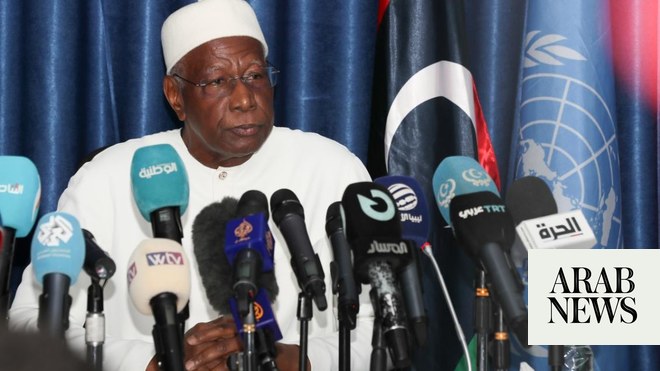
The leaders of Libya’s principal political groups met in Paris on Tuesday with the aim of reconciling their differences, affirming the unity of their fractured country, and giving their desperate people the prospect of peace after seven years of bloodshed and destruction. The meeting delivered on UN Special Envoy for Libya Ghassan Salame"s commitment to holding national elections later this year, as the key players agreed to polls taking place on Dec. 10.
The Libyan leaders face daunting challenges. In US Senate testimony last year, the distinguished commentator Frederic Wehrey described the “displacement and destruction” in Libya, the “collapsed authority” and the failure of governance. He had spoken of the desperate need for a stable government.
This seems a remote prospect. The Libyan Political Agreement, signed under UN auspices in December 2015, had aimed to set up a single national authority under a Presidency Council and an advisory body, the High Council of State. However, the country still has three governments: The Government of National Accord, based in Tripoli and headed by Prime Minister Fayez Al-Sarraj, which is recognized by the international community; in the east is the Tobruk-based House of Representatives, headed by speaker Aguila Saleh; while the third is the National Salvation Government, also based in Tripoli, which has the support of Islamists. To complicate matters, in April, Khalid Al-Mishri from the Muslim Brotherhood, was elected the head of the HCS.
However, the “strongman” in the country is Field Marshal Khalifa Haftar, a colonel in the Gaddafi forces who, after a failed coup in 1993, had lived in exile in the US and Egypt. He re-emerged in May 2014 to lead “Operation Dignity” and, after the capture of Benghazi three years later, Haftar’s forces took all major towns in the east, except Derna. The HOR has made him commander-in-chief of the self-styled Libyan National Army.
A new gadfly has entered Libyan politics in the shape of Saif Al-Islam Gaddafi, the son of late Libyan leader Muammar Gaddafi.
Talmiz Ahmad
Backed by Egypt, the UAE and Russia, Haftar has indicated his interest in uniting Libya under his leadership, much to the chagrin of the other civilian authorities, who view him as the “new Gaddafi.”
On April 5, Haftar suffered a stroke and underwent two weeks of treatment in Paris, leading to widespread speculation that the illness could be fatal. But he confounded his enemies with a return to Libya late last month and his announcement on May 8 that his forces had begun a siege of Derna. Once the city falls, Haftar will be even more powerful.
On the eve of the Paris conference, Libya’s fractious leaders had already begun playing political games. It was reported in March that Haftar had rejected the idea — said to have been proposed by those representing Al-Sarraj — of “overthrowing” Saleh and shifting the HOR government from Tobruk to Benghazi.
This month, it was reported that Al-Sarraj was seeking Haftar’s backing for his government. The same report also said that Al-Sarraj was discussing a deal with Saleh to elbow out Haftar.
Meanwhile, a new gadfly has entered Libyan politics in the shape of Saif Al-Islam Gaddafi, the son of late Libyan leader Muammar Gaddafi. His party, the Popular Front for the Liberation of Libya, announced in March that he would run in the presidential elections this year.
Perhaps other political figures may have thought this to be a credible challenge as, on May 20, seven top Gaddafi associates were enticed to Tripoli from exile in Cairo and apprehended by a militia known as the Special Deterrence Force.
Politics in Libya this election year is set to get really mean and vicious.
Talmiz Ahmad is a former Indian diplomat and holds the Ram Sathe Chair for International Studies, Symbiosis International University, Pune, India.












